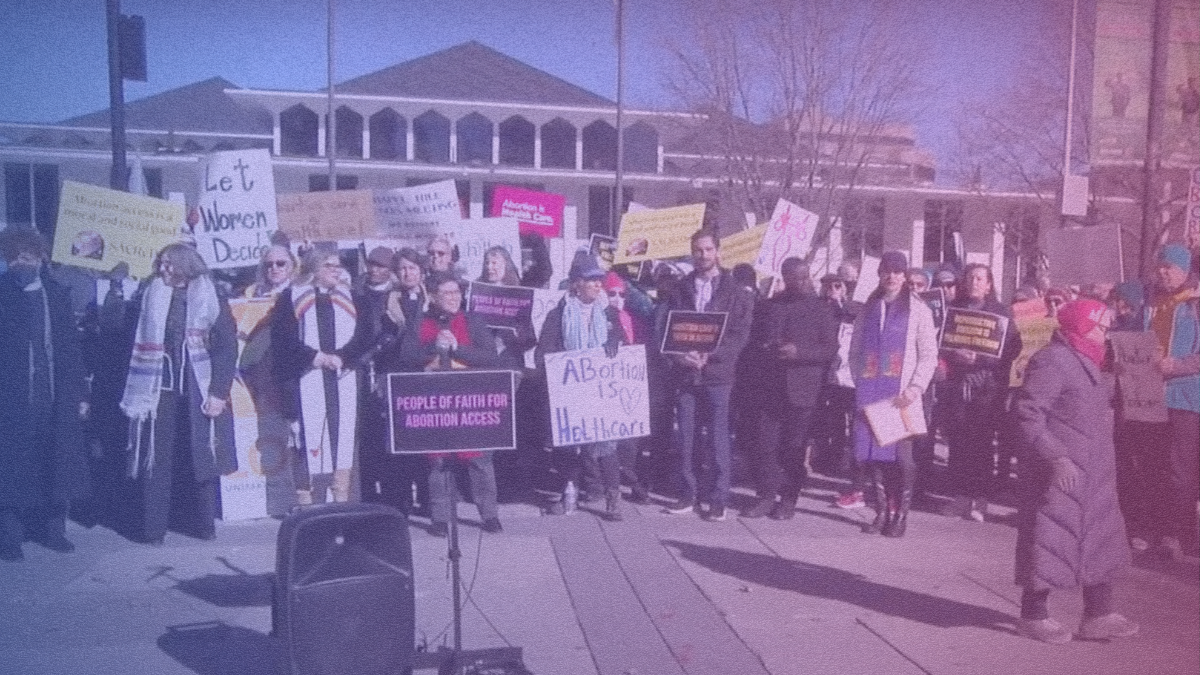Source: Editorial Board
On Jan. 22, pro-choice Americans marked 51 years since the U.S. Supreme Court’s decision in Roe v. Wade that legalized abortion and gave women the right to bodily autonomy. On June 24, anti-choice Americans will no doubt celebrate the fact that it has been two years since the Supreme Court overturned Roe.
Since the decision to overturn Roe v. Wade, many states enacted severe restrictions or outright bans on abortion procedures. The North Carolina General Assembly, which has a Republican supermajority, passed a 12-week abortion ban over Gov. Roy Cooper’s veto – and that ban is only the first set of restrictions that Republicans hope to put on abortion.
To mark the anniversary of Roe on Jan. 22, faith leaders from across the state came to Raleigh to hold a rally in support of abortion access. Faith leaders and others gathered outside the North Carolina Legislature for the “People of Faith for Abortion Access” rally.
Those who spoke made it clear that despite how Republicans often cite their Christianity as the reason they don’t support abortion, faith leaders are not all opposed to reproductive freedom. Many speakers explained how their religious beliefs back up their support of abortion rights.
“In my Baptist tradition, we value the freedom of personal beliefs, individual autonomy, and the separation of church and state,” said Rev. Jennifer Ingold Asbill. “Christians who impose their beliefs on others through legislation or any other means violate the civil liberties we all hold sacred.”
Unitarian Universalist Rev. Lisa Garcia Samson spoke forcefully in support of reproductive rights and against efforts to restrict those rights.
“I am proud to say that my own Unitarian Universalist tradition affirms that all of our bodies are sacred and we are each endowed with the twin gifts of agency and conscience that each of us should have the power to decide what does and does not happen to our bodies,” Samson said, “Because consent and bodily autonomy are holy.”
Samson also described the current moment in our history as one “where bodily autonomy has been replaced with control and criminalization of birthing bodies” and “the thing of nightmares and twisted science fiction.”
Rev. CJ Brinson, a community organizer with Down Home North Carolina, highlighted the impact of religious extremism during his speech and pointed out the hypocrisy of these politicians who only “care” about children before they’re born and not after.
“[B]ecause of religious extremism, abortion, which is a health care issue for women, is under the threat of being restricted by legislative bodies held in majority by men here in this state,” he said. “These same politicians and religious leaders continue to create policies … that destroy the lives of children.”
To back up his point about these harmful policies, Brinson highlighted some of the NCGOP’s most offensive acts, like restricting funding for education, denying workers the ability to get paid a living wage, loosening gun restrictions, creating a dearth of affordable housing, and over-policing communities of color that only serve to continue the mass incarceration of Black and brown people and the prison industrial complex.
Speakers also included those outside the Christian faith.
Rabbi Solomon Hoffman explained in his speech how Judaism views abortion.
“Jewish tradition makes something very clear: abortion is permitted and even required in certain cases when the health of the pregnant person is at risk. So for Jews, this is also an issue of religious freedom,” he said. “We must recognize that reproductive health care is life-saving in many cases.”
Rabbi Lucy Dehner focused on the fact that most Americans know someone who has decided to get an abortion.
“Almost everyone here has been in contact with a woman who has had an abortion. Studies show that one in four women who can get pregnant will have an abortion by the age of 40,” said Dehner. “We say to our legislators and our politicians: Take your laws out of our doctors’ office, take your paws off of women’s bodies.”
On Sept. 30, 2023, U.S. District Judge Catherine Eagles issued an order blocking two provisions of North Carolina’s 12-week abortion ban from taking effect during an ongoing lawsuit. Her order halted the enforcement of a provision to require surgical abortions that occur after 12 weeks – in cases of rape and incest, for example – be performed only in hospitals rather than clinics and she extended her temporary order from June 2023 that prevents enforcement of a rule that doctors must document the existence of a pregnancy within the uterus before prescribing a medication abortion.
Although two provisions were blocked, North Carolina’s 12-week ban remains in place and is having a noticeable effect on the number of abortions performed here.
More than 4,200 abortions were performed statewide in June, according to data from the Guttmacher Institute. That number fell to 2,920 in July after harsh new restrictions went into place, and stayed lower at around 3,000 in August. Overall, the estimated number of abortions in the state dropped 28 percent from June to August.





